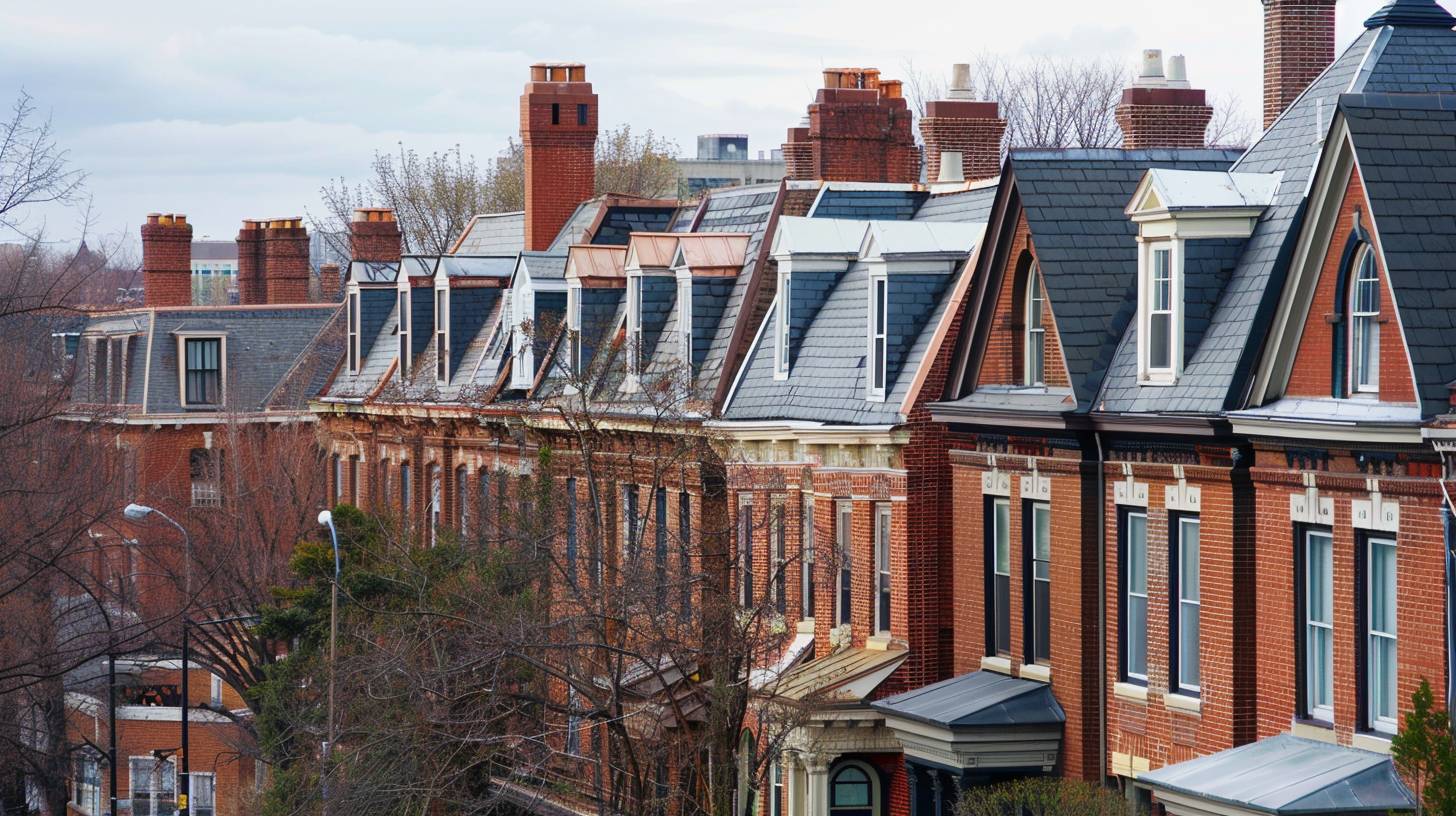Table of Contents [hide]
Roofing in DC isn’t one-size-fits-all. We’ve got historic rowhouses, busy alleys, and weather that swings from steamy summers to icy snaps. If you’re comparing roofing companies in Washington, DC, this friendly guide will help you sort climate needs, materials, permits, and how to pick the right roofing company with zero stress.
The Unique Demands of Roofing In the Nation’s Capital
Climate Conditions
DC brings hot, humid summers, heavy downpours, and occasional snow and ice. Roofs see intense UV, wind-driven rain, and freeze–thaw cycles. Leafy streets also mean gutters and drains clog fast if you skip cleaning.
For a quick reality check on temps and precipitation, visit the National Weather Service Washington, DC Climate Normals.
Common Roof Types
Rowhouses often use low-slope “flat” roofs with TPO, EPDM, or modified bitumen. Historic blocks add mansards, slate, and standing-seam metal with copper or galvanized details. Each system has different drainage and upkeep needs, and inspectors check that what’s installed matches the permit.
Historic Districts
Many DC neighborhoods fall within designated historic districts. If the roof is visible from a public street or alley, replacements usually need to match the original look. The Historic Preservation Office (HPO) staff can approve in-kind work; bigger changes or visible add-ons often go to the Historic Preservation Review Board (HPRB).
Permits and Inspections
Most roof replacements require a DC Department of Buildings permit. Inspections focus on deck condition, attachment, underlayment or membrane, flashing transitions, and drainage. In historic areas, appearance must match the approved drawings.
Essential Roofing Services for DC Homes and Businesses
Roof Inspections
Start with a full inspection and photo report. Focus on flashing, parapets, and where the roof meets brick or stone. These are common leak points.
Roof Repairs
Typical DC fixes include chimney flashing, wall transitions, scuppers, and clogged drains. Quick, targeted repairs can extend service life.
Full Roof Replacement
Most homes use architectural asphalt shingles, standing-seam metal, or membrane systems on low-slope sections. Expect permits and an itemized scope for decking, underlayment, and flashing.
Flat and Commercial Roofs
Mixed-use and commercial spaces often run TPO or similar single-ply systems. Routine coatings, drain maintenance, and semiannual checkups keep seams tight and water moving.
Choosing the Right Roofing Materials for Your DC Property
Here’s a quick guide to help you match materials to your DC home.
|
MATERIAL |
BEST FOR |
PROS |
CONS |
|
Asphalt shingles |
Most single-family homes; partial rowhouse roofs |
Budget-friendly, wide colors, fast installs |
Shorter lifespan than metal or tile; heat buildup without balanced ventilation |
|
Metal roofing |
Long-term value; wind exposure; rear additions |
Long service life, strong wind resistance, reflects heat |
Higher upfront cost; snow slides above sidewalks; coating choice matters in humidity |
|
Flat roof and low-slope membranes (TPO, EPDM, modified bitumen) |
Rowhouses, mixed-use, commercial |
Clean detailing, easy repairs, good with walk pads |
Ponding if drains clog; seam failures without routine checks |
|
Slate, clay or concrete tile, copper details |
Visible historic façades; high-character blocks |
Landmark look, very long lifespan when detailed well |
Heavy and costly; matching repairs require specialized crews |
TIP: Whatever you pick, make sure permits reference the exact product (with approvals), and that drawings show flashing, drainage, and ventilation details inspectors will look for.
Selecting the Best Washington DC Roofing Contractor
Experience with DC blocks really matters, especially with alley access and staging. For reputation checks, browse BBB Accredited Roofing Contractors in Washington, DC to see accreditation, review distribution, and recent feedback. Want manufacturer credentials too? Search GAF Master Elite Contractors to understand the certification and find certified crews.
Before you sign, ask for written scopes, timelines, materials lists, and any financing options. Confirm licensing, insurance, and bonding up front.
FAQs About Roofing in Washington DC
How long does a typical roof replacement take in DC?
Most single-family roof replacement projects take 1 to 3 days once materials arrive. Rowhouses and flat roof repair or membrane installs can add a day for staging, parapet detailing, and inspections. If your scope includes TPO roof installation or a flat roof reseal, build in extra time for weather and drying.
Can I stay home during roofing work?
Usually yes. Expect daytime noise and brief access limits around entries. Let your roofing company in Washington DC know about pets, alarms, and parking, so they can stage safely and provide better customer service. If crews are doing skylight installation or interior tie-ins, plan room-by-room access.
How often should I schedule roof maintenance in DC?
Twice a year is a good baseline. Clear debris, check seams and flashings, and photograph parapets and penetrations, especially after heavy rain or snow events. Add gutter cleaning and gutter guards if trees overhang.
TIP: A quick roof inspection after storms can prevent small DC roofing repairs from becoming bigger roof jobs.
What is the best season to replace a roof in DC?
Spring and fall offer mild weather and faster curing for adhesives and coatings. Summer heat and winter cold work too, but crews may shift schedules to avoid storms or freezing temperatures.
Start Your Washington, DC Roofing Project
You now know which materials hold up in DC, how permits and inspections work, and what historic rules mean for visible roofs. If you want real numbers and timelines, Mr. Remodel can introduce you to licensed, well-reviewed roofing contractors who work on rowhouses, low-slope membranes, metal, and historic approvals.
Tell us a little about your project goals and schedule. We will connect you with trusted local pros who provide clear, itemized estimates and warranty options, then set up a free, no-obligation visit at your pace. Submit your roofing project for quotes today.





